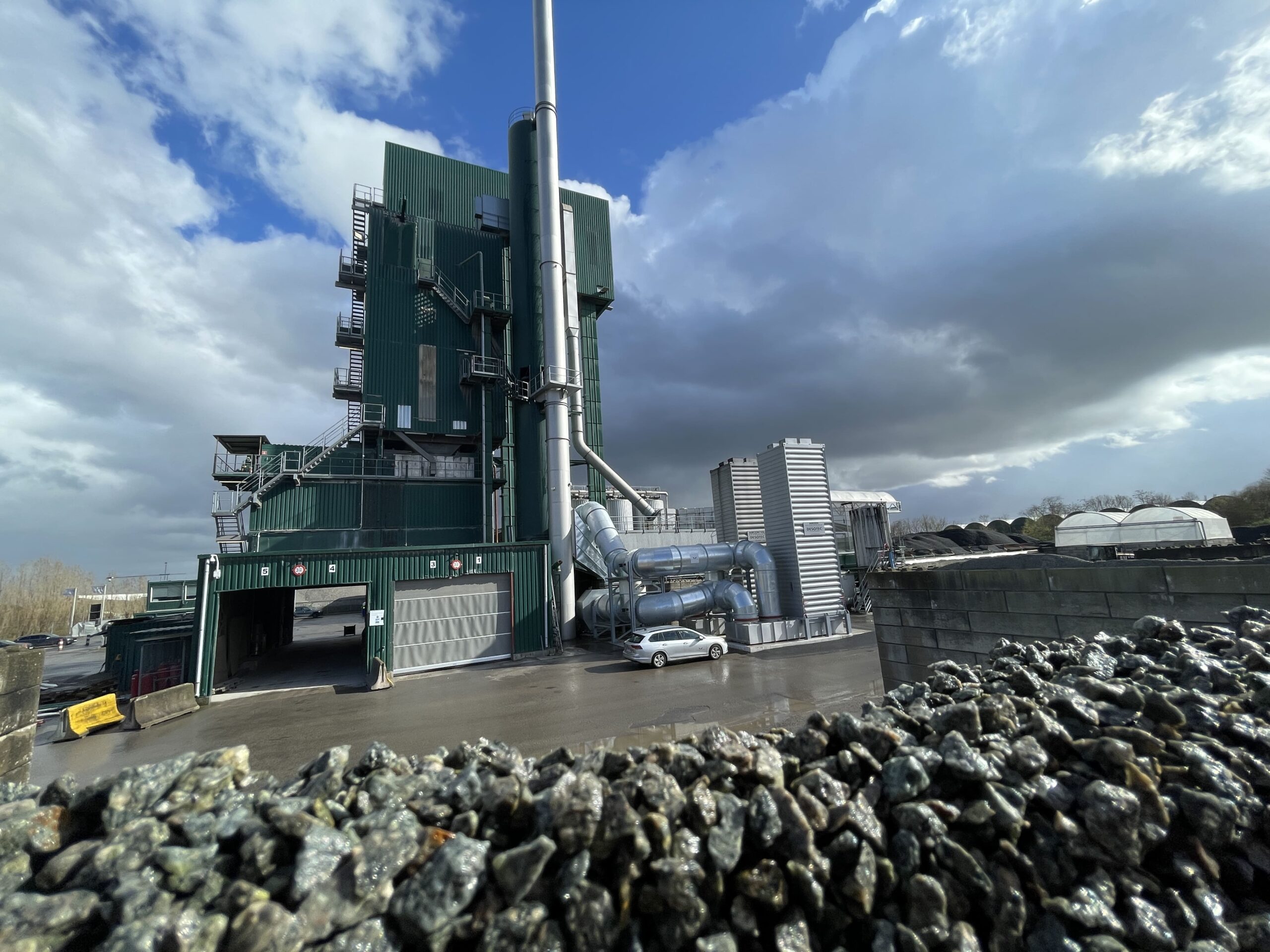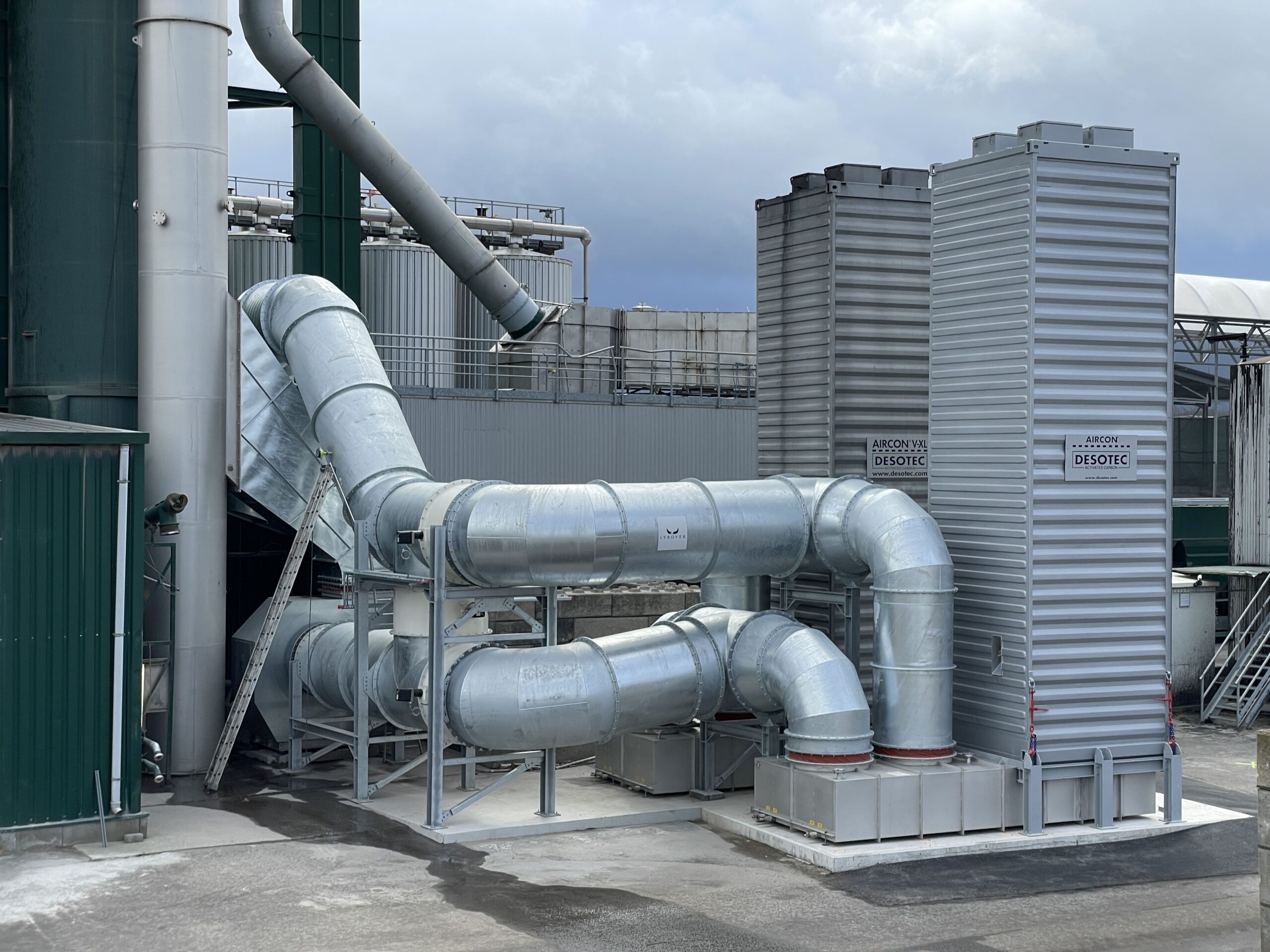Asphalt manufacturers are increasingly using recycled asphalt in their production process. When processing that old asphalt, nuisance odours and VOCs are released. This was also the case at Viabuild’s asphalt plant in Grimbergen. The manufacturer therefore asked Desotec to install an activated carbon filter. Lybover AIR in turn provided an extension of the extraction and filtration systems. This was no first for our colleagues (see also the realisation at FM Conway), but a project of this scale was a first for Belgium.
To make asphalt, mineral aggregates (such as crushed stone and sand) are dried and mixed with bitumen. Asphalt manufacturers are increasingly using a proportion of recycled asphalt from old road surfaces in the production process. On the face of it, a good thing. But drying the recycled asphalt releases fumes from the bitumen and rubber left on the road surface. Those fumes cause odour nuisance and contain harmful substances called VOCs (volatile organic compounds or volatile organic compounds).
A dust filter was in place, but an additional filtration system was needed to reduce odour and VOC emissions. Viabuild asked Desotec, a specialist in environmental engineering, for a solution. They proposed a mobile filter with activated carbon and engaged Lybover AIR to extend the existing hot and cold air extraction and filtration systems. Both systems had to direct the loaded air to the mobile activated carbon filter and blow out the purified air again.
Complementary expertise in filtration
“The partnership between Lybover and Desotec means that the customer could rely on the expertise of two complementary parties for a total solution.” clarifies Filip Doucé, Hub Manager Beringen at Lybover AIR.
Desotec first conducted a smaller-scale pilot project in Grimbergen to demonstrate the effectiveness of activated carbon. Once the effectiveness was proven, it was time for action. Filip Doucé: “First of all, we had to determine the flow rates. We needed extra fan capacity to guide the air through the extensive pipe network. Ultimately, one system would move some 85,000 m³ of air at 70° C from the dryer plant every hour. The other system would move 25,000 m³ of air at room temperature from the truck loading area. With those figures in hand, we were able to size the plant.”

3D scan and total station for accurate assembly
One of the biggest challenges in this project was the very limited space for what would become a substantial installation. “The task was to use as little space as possible. In fact, around the asphalt plant there is always traffic from trucks and wheel loaders. To be as accurate as possible, we first made a 3D scan of the plant and its surroundings. Based on that, we provided a three-dimensional design. That way, we were sure there would be no conflicts. Then we used a total station to accurately and efficiently mark all anchoring points. The effective execution of the works was done together with our colleagues from Lybover INSTALLATION,” says Thijs Van Lierde, Project Engineer at Lybover AIR.

Activated carbon filters: a necessity for asphalt manufacturers
The finished activated carbon filter system ensures that odour nuisance and VOC emissions from Viabuild’s asphalt plant are now under control. “A project on this scale is a first for Belgium. But more will undoubtedly follow. Indeed, all asphalt manufacturers need effective air treatment if they want to remain compliant with environmental legislation and reduce emissions of dust, odour and VOCs. In collaboration with our partner Desotec, we offer complete extraction and filtration solutions, from dedusting to filtering fumes and VOCs. Whether it is a completely new installation or an extension of an existing system, we are happy to take on the challenge,” concludes Filip Doucé.
The standards around odour emissions and general emissions are becoming increasingly stringent in our society. Due to the increasing share of recycled asphalt materials, the need for high-performance filtration will also increase in the asphalt industry. Activated carbon captures VOCs and odour components from air streams via adsorption. This makes activated carbon an excellent solution in this market.